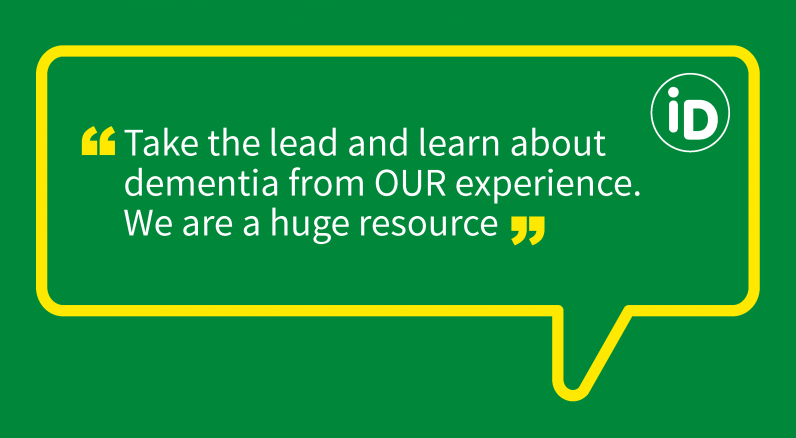Above quote from the York Minds and Voices Dementia Strategy.
At the UK Dementia Congress in November last Year, Professor Claire Surr delivered the Tom Kitwood memorial address. It was based on her in depth study on ‘What works in dementia education and training’.
It’s a great piece of work. Professor Surr rightly highlighted the importance of context in dementia training. She mentions the need for a learning culture to be present. (You can watch the full address here)
It very much chimed with a lot of the questions I have been asking myself over the years about how and why training works in some places and not others and about how to create more of a culture of learning.
Some time ago I was asked to be on a sub-group to look at the ‘learning well’ element (what else?!) of a local dementia strategy. I got the sense we were expected to come up with a long list of who should know what at what level – a sort of matrix if you like. It’s the sort of stuff that is out there in abundance along with tiers of learning, workbooks and lots of certificates. I just knew putting something like that together would not make any significant difference and would frankly bore me to tears.
Back in November at the UK Dementia Congress a ‘Question Time’ panel were asked their thoughts on dementia training being mandatory for all. ‘Oh yes!’, people cried. ‘Oh no!’ I thought.
I imagine all those young people, fresh into the job being given workbooks and targets hanging over them. Such training has, I’m afraid, become part of the ‘processing’ of new staff and satisfying regulatory requirements rather than anything that might serve to retain staff or to create a sense of belonging or ownership of learning – A culture of learning if you like.
I can’t be the only person who finds working in and thinking about dementia care absolutely fascinating. So, how we might feed and fuel fascination in the area of dementia learning and development is exactly what we focussed on in our ‘learning well’ sub-group.
You see, the mandatory element shouldn’t be on the staff to churn out buzzwords on workbooks or to sit for hours in front of online learning modules. Rather the obligation should be on organisations and wider communities to offer an engaging, fascinating suite (or a buffet) of learning opportunities for ALL. That way, anyone can pick and choose to access whichever learning opportunity fascinates them. This promotes an ownership of learning i.e. people being invited to learn stuff rather than being told to.
There is a whole range of fascinating topics and resources out there to make a buffet worth gorging on! Many, if not all of these, can be updated, re-designed and delivered with and by people with dementia too.
Only last week we delivered a 2-hour learning session to 20 local community health and wellbeing staff. By ‘we’ I mean myself and 3 people living with dementia. ‘I’ve learnt more in the last two hours than I have in the last 4 days when I spent all day looking at online tick-box, mind numbing so-called training,’ said one participant. Why, because our session, entitled ‘Engaging in Everyday Situations’ was fascinating. The first-hand testimony was powerful, frank, challenging and informative. It stuck.
If you want to ensure that you lay out a buffet that meets the learning needs of all, there are 3 questions I believe need answering:
- What is it that people with dementia want others to know and learn? So, it begins as ever with people with dementia at the heart of the work
- What is it that people with dementia and their care partners and supporters want to learn themselves? and…
- What is it that organisations, staff and all other stakeholders say they want to know and learn?
I think up to now, talk of a culture of learning has focused almost exclusively on question 3 – the learning needs of staff and their organisations. However, to create fascinating relevant learning opportunities, you cannot ignore questions 1 and 2.
So, please, collaborate, not only with people living with dementia and their supporters, but also with other local stakeholders in your area.
Create and sign up to a ‘commitment to learning’ across your patch. We are currently working with the London Borough of Hammersmith and Fulham to do exactly that and looking to do some of the following as part of what they are calling their Dementia Academy
- Involving local residents with dementia in the design and delivery of learning and development activities across the Borough
- Opening training to each other and families and people with dementia too
- Providing access to learning events across disciplines and organisations
- Hosting an ongoing learning and development conversation to share ideas and reflect on practice and issues across the Borough
- Pooling of training budgets and resources
- Provision of ongoing group supervision/action learning opportunities for staff (from across all sectors) engaged in what can be intense and intensely stimulating work.
So, if you want to continue the discussion and would like support in answering those questions one and two from above, do not hesitate to get in touch with us. We’ll be fascinated!
Damian Murphy
Co-Director, Innovations in Dementia

